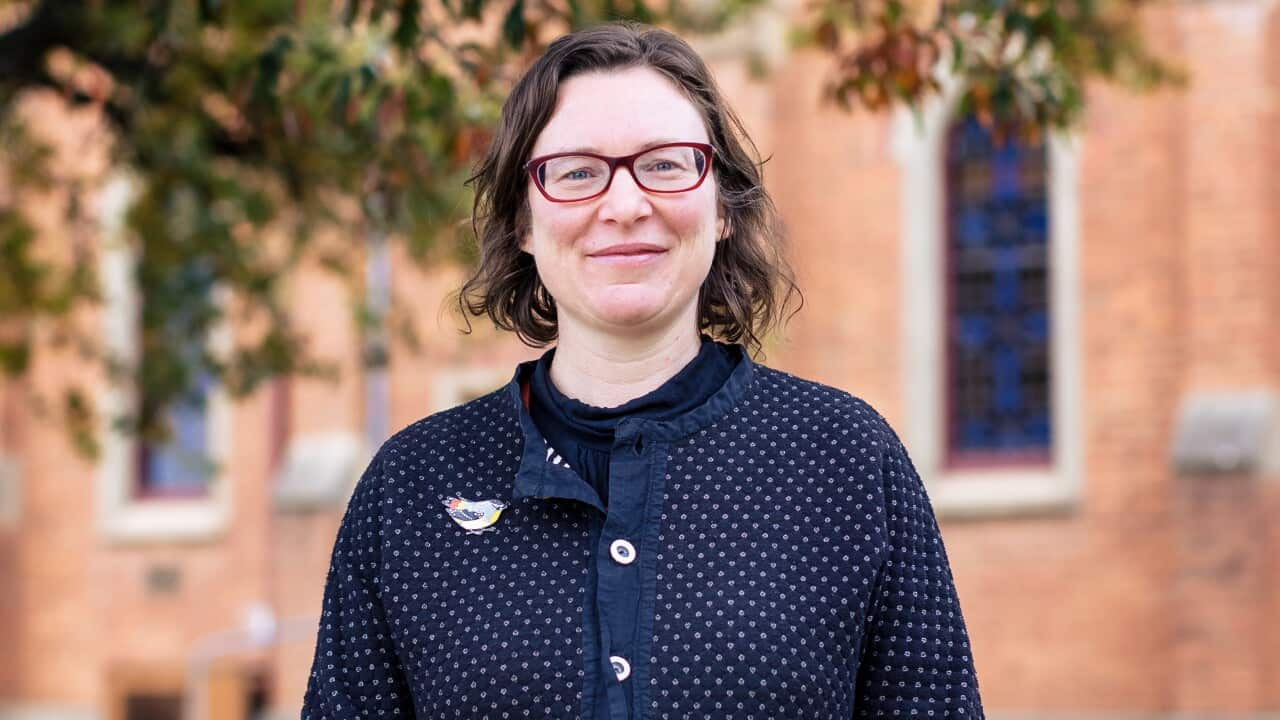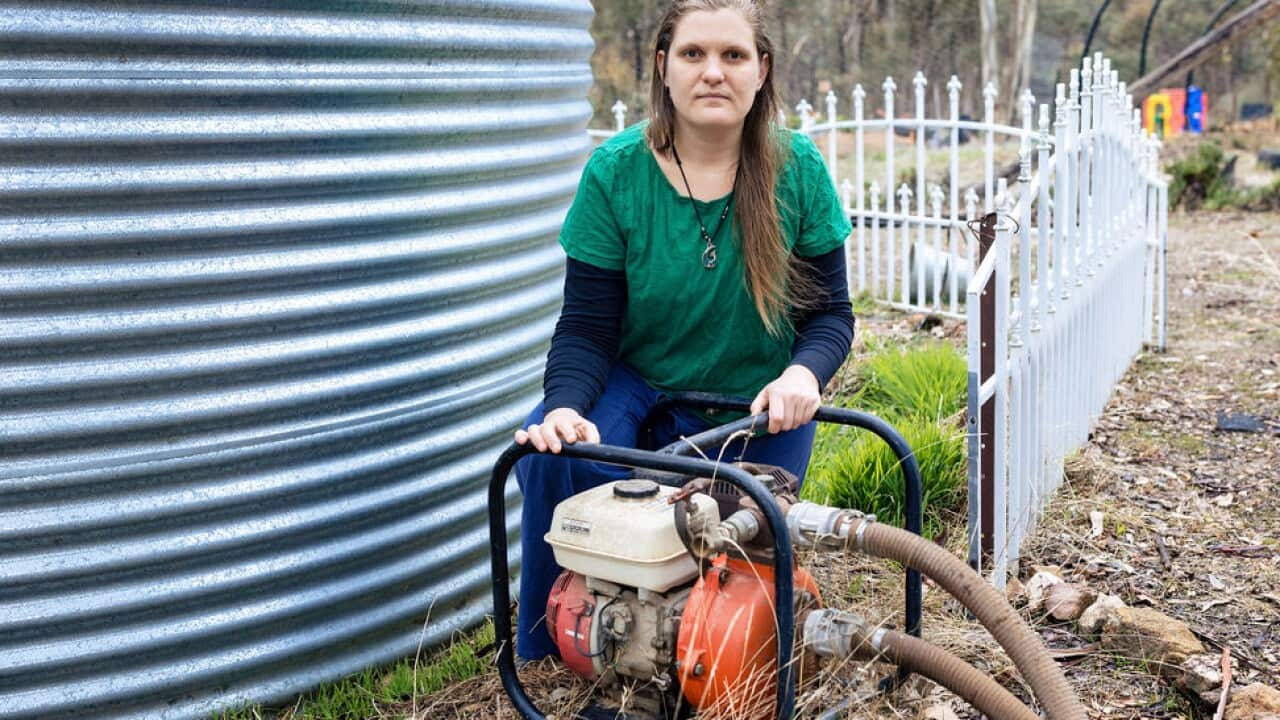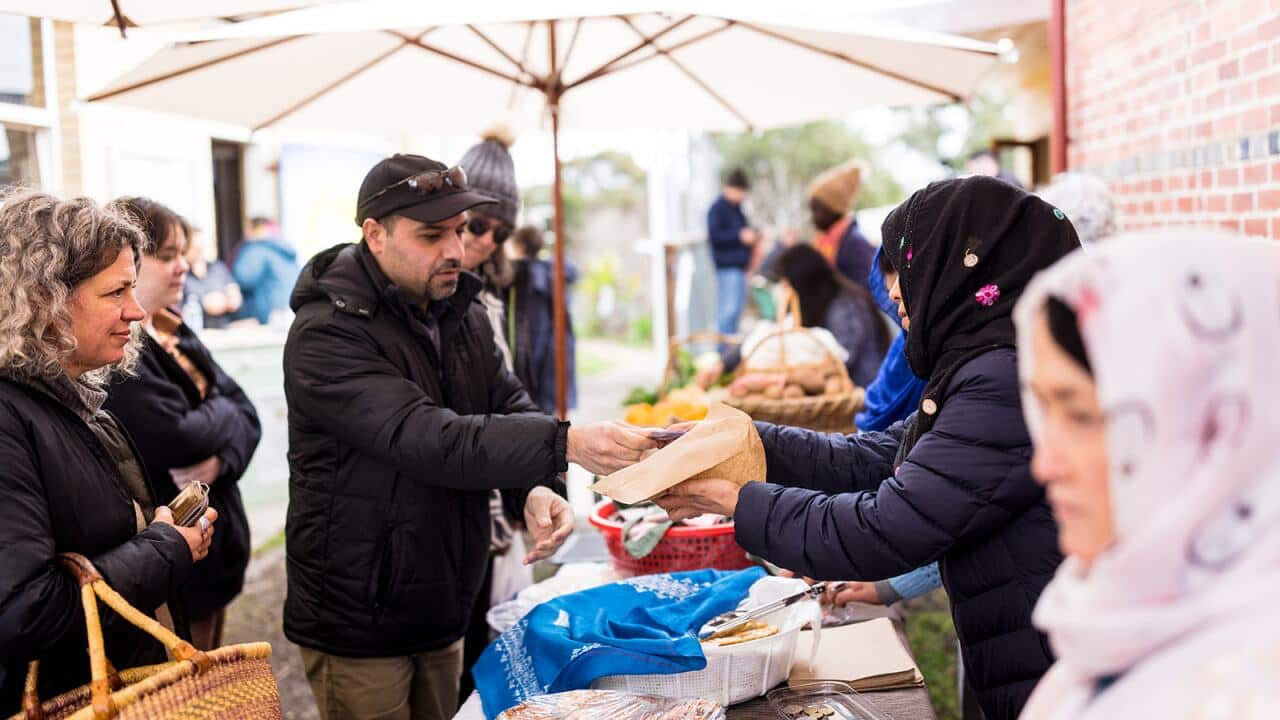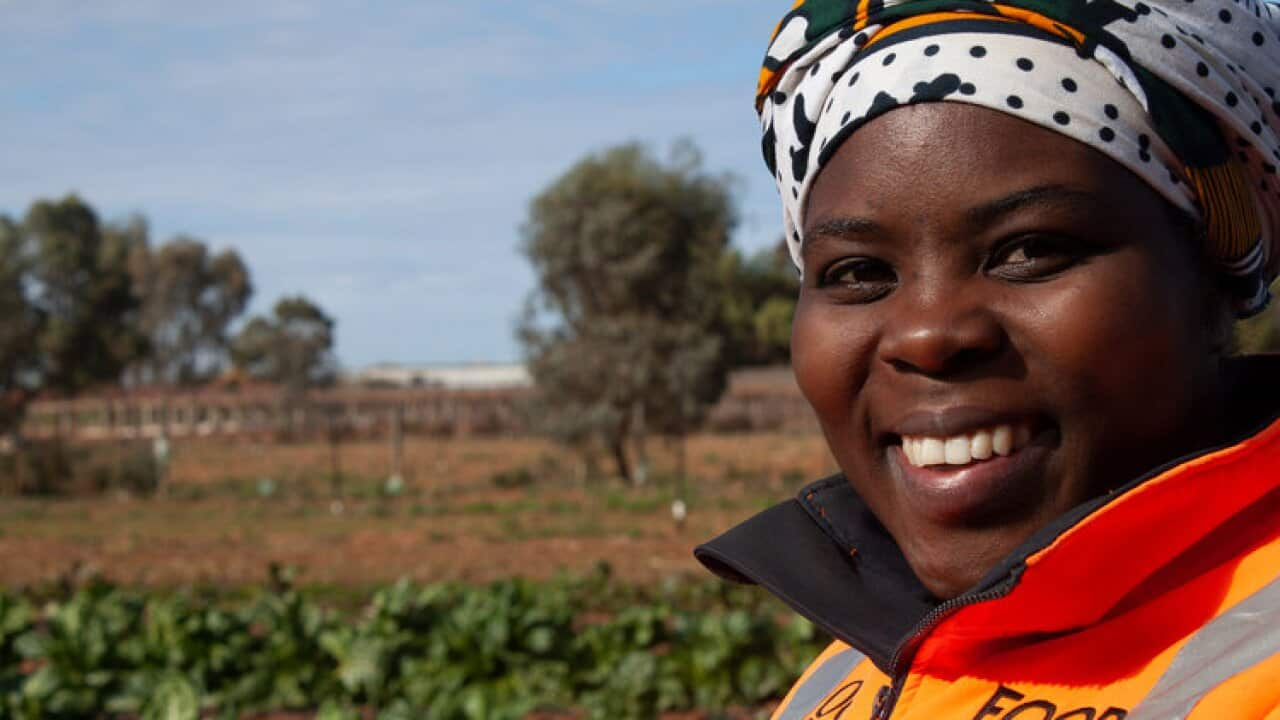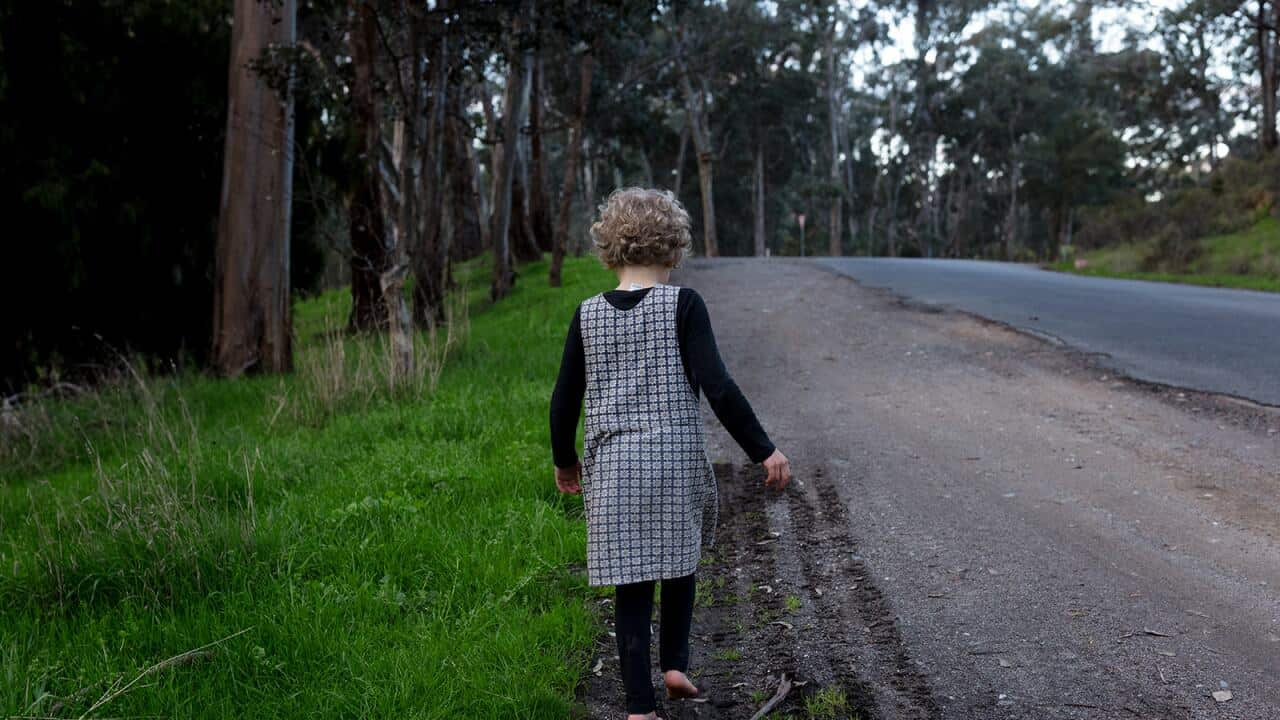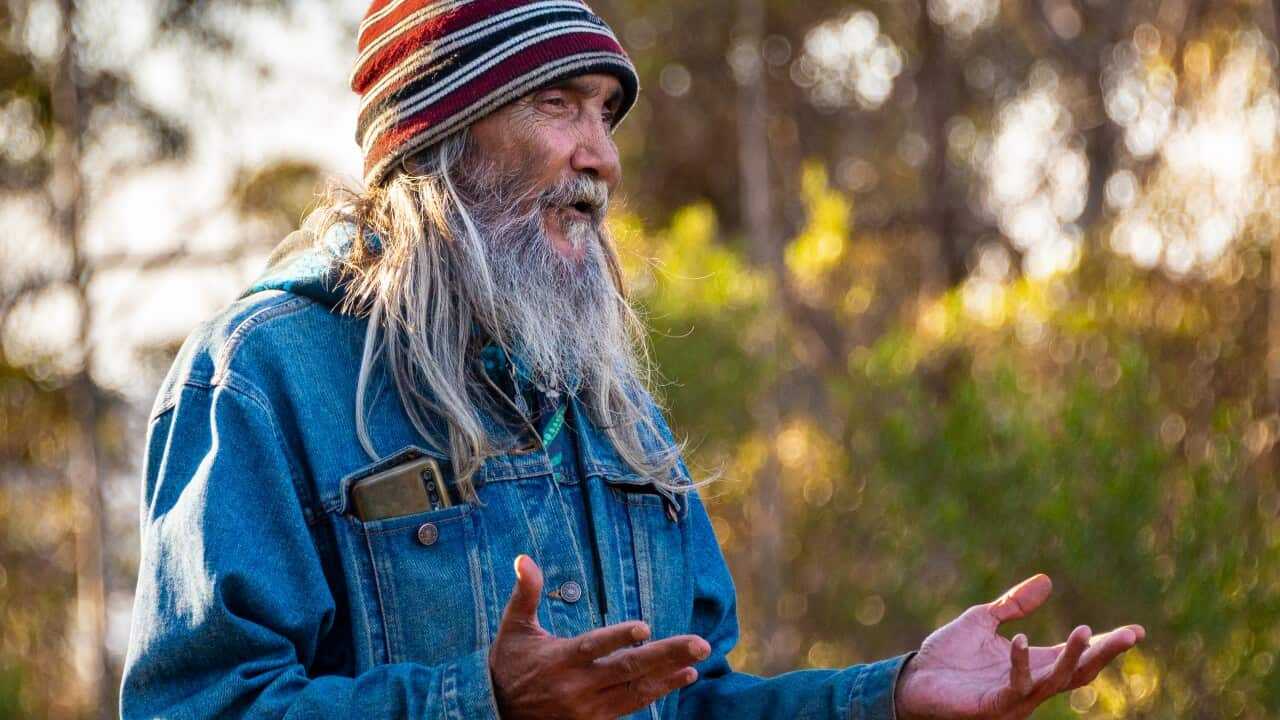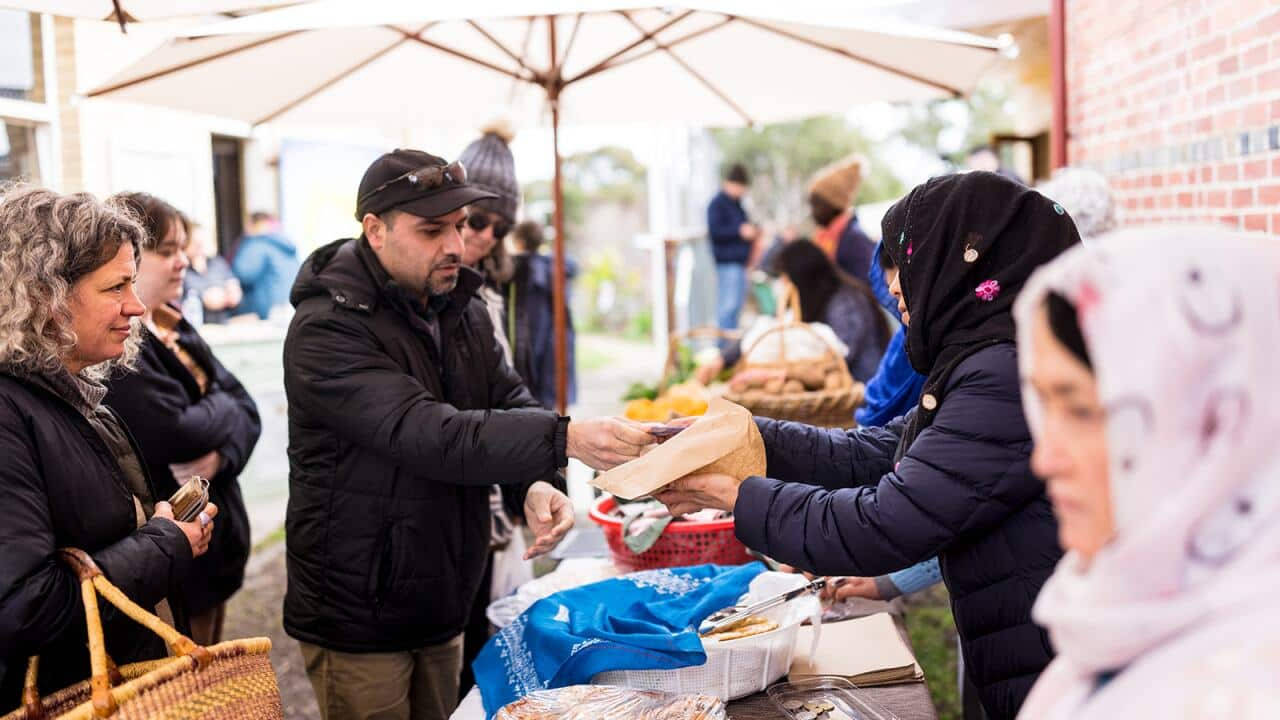In this small town with mostly pleasant weather, discussing climate change wasn’t easy.
You couldn't even mention climate change, as long as the weather was good.Maldon resident
Cognitive psychologist Ben Newell says that the debate has largely shifted from climate denial being an issue to climate inaction being the problem - we acknowledge the seriousness of climate impacts, but are not following through with making changes in our lives.

Cognitive psychologist, Ben Newell Credit: Kyla Brettle
Amy Atkinson of Maldon Neighbourhood Centre starts the Climate Ready Maldon project to subtly introduce the idea of climate adaptation to the community. The project aims to help residents to help themselves, in three ways:
- Making homes comfortable in hot weather
- Helping residents plan for bushfires
- Building resilience through community connection, meaning that the project always involved community volunteers, and got people meeting and talking.
Local people are the solution. It's around empowering people in the community to make their own changes.Amy Atkinson
Community bushfire plan workshops
Climate Ready Maldon teamed up with the Country Fire Authority (CFA) to run community workshops. Residents made Bushfire Survival Plans, figured out safe routes to escape, and thought about how to help vulnerable community members in the event of a bushfire.
The workshops were hands-on, letting locals discuss and plan for different emergency situations together. The goal was to encourage everyone to plan ahead, making the community better prepared and resilient..

Miranda Bone, Maldon Resident Credit: Carmen Bunting
Thermal assessments for home comfort
Climate Ready Maldon offered free advice and home assessments to help locals make their homes cooler.
Specially trained volunteers assessed houses, looking at factors like shade and heat sources. Residents got practical recommendations, like using shade cloth, to keep their homes cool without spending too much money. The program aimed to make houses more comfortable and energy-efficient during heatwaves and hot, dry summers.
Challenges in community engagement
Anthony Morrey, a volunteer in the thermal comfort assessments, was surprised at the low level of the free assessments by residents.
“There's a bit of hesitancy to be active around these sorts of things. It's like, ‘We'll just cope with the hot days. We'll just cope with things the way they are.”
Community connection is key
Amy Atkinson explains the model of the Climate Ready Maldon project: “It's not like a spoke and hub, where we want everyone to be connected to the Neighbourhood Centre. We want people to be connected to one another. And resilience comes from that; from knowing your neighbours, from knowing people in the community, and feeling like you belong.”
LISTEN TO

Starting climate conversations in small town Victoria
SBS Audio
18:56
Guests in this episode of Everything We Need
Amy Atkinson, Ben Newell, Lindsey Glover, Miranda Bone, Anna Robertson, Anthony Morrey and Andy McInnes.
Credits
Kyla Brettle: Research, recording, editing and sound
Jane Curtis: Story editor and consulting producer
Rob Law: Original Music
Photography: Carmen Bunting
Produced with support from the SBS Audio team, Caroline Gates and Joel Supple
This series is based on an earlier series called Climate Ready Stories commissioned by Dona Cayetana and Geoff Caine as part of the Victorian State Government's .
Transcript
This podcast was produced on the lands of the Dja Dja Wurrung. We pay our respects to elders past and present and express our gratitude for their Care of this Country- and extend that respect to all First Nations People listening.
Amy Atkinson: We did some work a few years ago - trying to understand what people’s environmental concerns were, from living in this area you couldn’t actually mention ‘climate change’.
Vox Pop: Because it’s always nice and sunny and fresh - as long as it’s like that I’m happy - but no, I haven’t thought about it more deeply in a scientific way. [Laugh]
Amy Atkinson: But talking more broadly about environmental concerns - I realised there were a lot of people that were very worried about climate change and what that meant for our community.
It’s easy to blame sceptics for holding up action on climate - but they only make up 5 per cent of the population - so, really it’s everyone else we need to worry about
Vox Pop: It's a bit hard when you are popped up with these intellectual questions.
I’m Kyla Brettle and you are listening to ‘Everything we need.’ a climate podcast about.... making change in our lives for the better.
With stories about people who are not just reacting to the effects of climate change, but tackling them head on - and rethinking what we all need to thrive now, and into the future
Ben Newell: There’s been a shift in the debate from an out[right] denial of climate change being a thing we need to concern ourselves with - or it’s not happening - to an acknowledgement that yes it is happening - but people talk about climate denial happening on different levels as well - and in a sense, if we carry on our lives ‘business as usual’, then we are all sort of complicit in a type of denial…
Kyla Brettle: Like the old argument that silence is acquiescence…
Ben Newell: Exactly, yeah - carrying on the same is as bad as not doing anything - it’s an active choice not to make that change.
Ben Newell, Professor of Cognitive Psychology at the University of New South Wales, speaking with me at the 2023 Climate Adaptation conference in Adelaide.
We’ve spent so long arguing and researching and verifying the climate crisis - that whatever time we had to stop it has kind of evaporated - and so the debate has shifted to include how we learn to live with this, or adapt.
You might think that dealing with a problem that is here and now - is easier than dealing with a future, theoretical problem - but it doesn’t necessarily follow.
So, how do you get a small country town to adapt to the changing climate - when no one wants to talk about it?
This is something Amy Atkinson has thought about a lot.
Amy Atkinson: Hello Mal…how are you? Excellent…
Amy loves making lists and is the coordinator of the Maldon Neighbourhood centre, a local not-for-profit that’s a hub of activity from running markets
Amy Atkinson: a community garden.
Playgroups
Amy Atkinson: drop in internet cafe
And even bus tours.
Amy Atkinson: We’ve got a wine appreciation tour heading off into the Pyrenees wine region next week - and then an op shop tour in another couple of weeks…It’s really localised, it’s about place and the underlying thing that connects everything is social connection and it’s about bringing people together.
Lindsey Glover: When I first came here, it was nearly Easter, and someone had tied a hot cross bun onto my front door to welcome me to town. So - that’s what it’s like.
Maldon - is an historic gold mining town that’s known for it’s picturesque street scape - it’s on Djaara Country, about an hour and a half drive north of Melbourne.
I meet up with Amy at the weekly community lunch
Background voices:
I’m just going to be help serving...
What’s the main course again? - Maine course - spaghetti bolognese with garlic bread. Oh yum, have I talked you into it yet - oh, where’s my five dollars.
Thank you so much
How generous with the sauce? That will be good, thank you....
Amy Atkinson: Because the median age is older, there is a lot of retired people, so it’s sort of a bit bustley in the day and is a bit quiet at night a different story - everyone tucked up in bed
Vox Pop: It’s like an unofficial retirement village - but forgive me for staying that because not everyone would warm to that.
Amy Atkinson: It is actually really vibrant community and is distinguished by having 80 plus community groups - so massively involved and active community.
Lindsey Glover: Before I blinked I was signed up for the garden club - I decided I wanted to play canasta - so we set up a canasta game in the community centre.
Amongst all this business and activity, Amy's aware there’s something no one’s really talking about... or dealing with.
How climate change is affecting Maldon - the hotter dryer weather, more heat waves and bushfires
Amy Atkinson: We all need to be ramping up our response. So, I guess our response wasn’t about a big push from the community to taking action - it was more, we wanted to push the community into thinking about what action they should be taking.
So Amy and the Neighbourhood centre start a project called Climate Ready Maldon.
Amy Atkinson: One of the powers of community organisations - we are grass roots organisations, really - we can make change in the community…
Kyla Brettle: Do you have a story or a moment where it started or came together - was it a bang?
Amy Atkinson: I don't have that at all - maybe I woke up at 6 and said, I should start a list.
Amy Atkinson: So the Climate ready Maldon started by looking at how we can help people respond to the changes that are coming. And part of that is around acknowledging that there is risk, and that itself gets people thinking about what caused it in the first place. - So rather than starting with that point, it leads people back to that point….
Climate Ready Maldon gets the local community into climate adaptation by stealth.
It side steps the debate around the causes of climate change and instead... focuses on something ingrained in the Australian DNA. Talking about the weather....
And how this lovely little town in Central Victoria gets sweaty, sticky and downright unpleasant in one of those hot, hot summers.
Miranda Bone: I’ve been out in a 45 degree day already and it was scary. Like, we got caught out without water. I was really glad I was able to call a neighbour…
It’s easy to chat about the weather with Anna, Miranda and other parents hanging out with their kids at the neighbourhood centre playgroup.
Anna Robertson: I do worry about our neighbours - our elderly neighbours and often we do check on them during the hotter months.
Vox Pop: Heat stroke - dehydration, things like that…If it is consistently over 45, we’ll all end up suffering
Maldon is surrounded by bushland - and something Amy from the Neighbourhood Centre wants residents to talk more about is the likelihood of a bushfire....
Amy Atkinson: People didn’t necessarily have bushfire plans, even though we are currently in an extreme bushfire risk area.
Miranda Bone: I’ve looked at the predictions for the climate over the next 20 years, and I'm actually a bit scared about that.
Amy Atkinson: If a fire was to come through, even if you live in the centre of town you're still at risk.
Miranda Bone: So where do you go on these horrific days, that are really hot, with lots of wind? You don't feel safe - driving on the roads.. What do you do?
Accepted advice - says you work this out before bushfire season - by knowing your risk and making a bushfire survival plan - so Climate Ready Maldon and the Country Fire Authority, or CFA for short, together run workshops to get people thinking through the steps they’d take in an emergency.
Amy Atkinson: So at the end they would go away with maybe 75% of their plan done. And then they could ask questions on the spot going, "Oh, I'm thinking about my pets. What do you do with pets? Or what direction might fire really come from?" And the CFA could really talk about on the ground experience, about what's happened previously. We followed up with another two workshops that were much more interactive. And the third one actually didn't even have a CFA member there. It was just the group, nutting things out themselves, and going, "Oh, what did you guys think about, like, where are you going to evacuate to?" Like really, locals helping each other I suppose, to think these things through. We didn't get huge numbers, but it was really great to see the outcomes from those workshops.
The other thing Climate Ready Maldon does - is try to inspire the community to better prepare for heat waves...
Our bodies don’t deal with high temperatures well. Heat gets called a silent killer - because it makes existing medical conditions worse. So, during a heatwave people are more likely to have a heart attack or a stroke, kidney failure and it affects conditions like diabetes and high blood pressure - people also suicide and there is more violence on hot days too… and those most vulnerable to heat are the elderly, pregnant women and young children.
Amy Atkinson: And then understanding that people mainly are in their homes in the heat - that we wanted to focus on that, for making a change. So along with our beautiful streetscape da da da, we have lots of old miners cottages: .. And they're incredibly leaky. They're designed to be temporary accommodation. They're designed for very short people (laughs). So there's some real issues I suppose, that were clear.
So, Climate Ready Maldon offers Residents and home owners free advice and a thermal assessment of their home, from a local volunteer specially trained up in ways to make houses more comfortable and energy efficient.
Anthony Morrey: My name’s Anthony Morrey and I was approached to be one of the volunteers on this team of about 8. Probably out of the eight of us, we all did 3-4 assessments in Maldon.
Who wants to waste money on heating and cooling? So, you know, trying to help people stay more comfortable generally speaking. Less pressure on the environment in the end. Yeah!
Anthony Morrey: (Hey! How are you going?) Here, we're at at Andy’s place. This is where I came to do an evaluation. (How was your summer?)
Andy McInnes: Oh yeah. Pretty good. Survived.
Anthony Morrey: You survived? Yeah... Was it as hot as other summers...
Anthony Morrey: And then going round, and basically having a casual chat with them. You know, "How are you?" And have a cup of tea and blah blah. And then going around looking at the house. So looking at the orientation of the house would tell you where the shade spots are. Where the cold spots. where the heat sinks are.
Kyla Brettle: And so this is the west side of the house, isn’t it?
Andy McInnes: Yeah this is where you get the main heat in the summer from,
Anthony Morrey: So it could be really a simple case of dropping shade cloth on the north west side of the property. And they got a voucher as being part of this program. So they were able to kick start any investment back into the house.
Anthony Morrey: Well, how did you find that report I wrote?
Andy McInnes: Ah no, it was good. It gave me lots of options of things to start with. And see that I could make a bit of a difference to the place without laying out too much money. Yep.
Anthony Morrey: Yep.
Andy McInnes: So I found it really helpful in that way.
Kyla Brettle: Did you feel like you learnt about climate change and the impacts on Maldon through your participation in the program?
Andy McInnes: Well, yes, I suppose, a little. Um, I didn't realise exactly how vulnerable we can be to things like the fires, and what impact basically the whole warming has ... You see a lot more of the trees dying off in the summer and it's having sort of a destructive effect.
Later on, I meet up with Amy and her team of volunteers for their debrief session.
Amy Atkinson: So we thought we'd gather in the important places in town - the local pub.
Vox Pop: One of the main things I've learnt from the project is how hard it is to actually get onto the people who need to get this done. (Yeah). And it is very much a matter of word of mouth. To get the assessments done.
Amy Atkinson: To participate in the assessments?
Vox Pop: Right. To get them to accept that their houses are pretty...
Amy Atkinson: But it's true, like I had someone who...
Anthony Morrey: You know the people that certainly responded to this program were people who were proactive about being a little bit more on top of things. And I'm saying that just because the amount of people that responded to the program, even though Amy did a fair bit of promotion for it, she was a little bit surprised how many.... the lack of how many people actually responded.
There's a bit of hesitancy to be active around these sorts of things. It's sort of like, perhaps, ‘We'll just cope with the hot days. We'll just cope with things the way they are.’ You know, change, I think, anywhere, is hard, for anyone personally, or communally, or whatever it is.. but then sometimes when you just offer the cake, people aren't eating it. And then that's something else.
Back at the playgroup - where two year olds are waddling about with buckets of sand, I chat with mother of four, Anna Robertson.
It’s easy to talk about how we can change the future the crisis - doing things like recycling, looking after the environment, switching renewable energy… but not so easy to talk about how the crisis will impact our future.
Kyla Brettle: What are your thoughts on how we actually become more resilient and actually adapt to what's coming?
Anna Robertson: Hmm oh gosh. I'm lost for words. I don't know where to go with this one. Sorry Kyla. What do we do? It's hard. Yeah, it's a tricky question.
Kyla Brettle: It is a tricky question and you do actually find that people don't talk about it all that much.
Anna Robertson: Yeah yes. I think that Climate Change Maldon group is a good step, that that's a great way to move forward.... I do need to find out more about the program itself.
In the year it ran, Climate Ready Maldon managed to the box and made a start on talking about CLIMATE CHANGE
Amy Atkinson: The groundwork of the partnerships and relationships takes a lot of time. And actually is the scaffold that makes the project a success or not. But I think what has been really important is that people, local people, are the solution I suppose. So that it's all been based around empowering people in the community to make their own changes, has that ripple on effect. The fact that we've got half a dozen trained volunteers now in the community, understanding thermal comfort and those changes that can be made, that can live on. If you're the volunteer, and you've looked at someone's house and you meet them down the street, there's a conversation right there. That's another link in the web. It's not like a spoke and hub where we want everyone to be connected to the Neighbourhood Centre. We want people to be connected to one another. And really it's because of that resilience that comes from that. From knowing your neighbours, from knowing people in the community. And feeling like you belong here, is really so important.
Getting our heads around adapting to a changing climate - is a bit of a process.
Amy’s approach to getting people on board seems really smart - she puts contentious stuff to one side and focuses on what we clearly agree on - and I like how she talks about it being something that we chip away at - through lots of little actions that add up to a new normal over time.
So a big thank you to Amy Atkinson - and everyone else you heard - Anna Robertson, Miranda Bone, Lindsey Glover, Anthony Morrey, Andy McInnes and Ben Newall
In the next episode I'm heading to Maryborough, north of Ballarat, to see how they're preparing the next generation for a climate changed future, even though we're not dealing with it so well ourselves.
Anna Robertson - I know some of my older children feel a bit worried about climate change and they are not feeling confidence that perhaps the rest of us adults are doing enough - I certainly hear that from one of my older children
Kyla - it’s hard to know what to say when they say that (yes) because they are right
Anna - they are right.
Make a note to follow Everything we Need on SBS Audio - or wherever you get your podcasts.
Everything we need is researched, recorded, edited and produced by me, Kyla Brettle
with Jane Curtis as story editor and production assistance and show notes
All the music you heard was by Rob Law - with a Uncle Paul Chapman playing the yidaki
and Production photography by Carmen Bunting
And all made with support from the SBS Audio Team's Caroline Gates and Joel Supple
This podcast is based on an earlier documentary series produced as part of Victorian state government's Climate Ready Plan for the Lodden Mallee region - with executive production from Dona Cayetana.
Thanks for your company, I'm Kyla Brettle - and see you next time.
